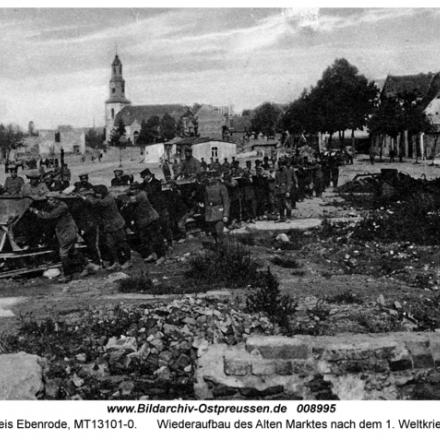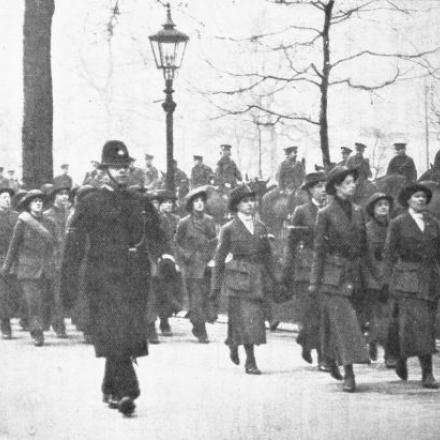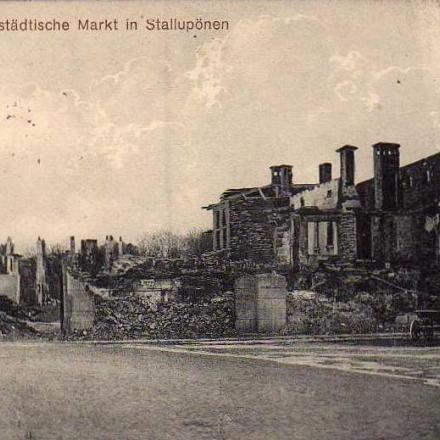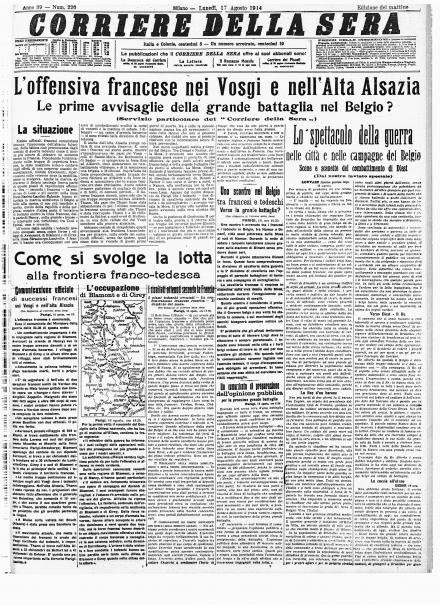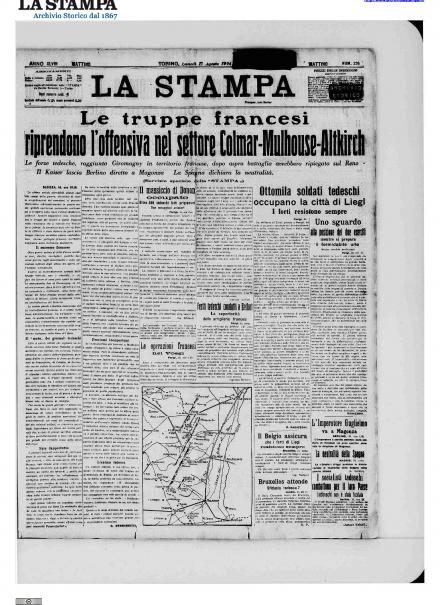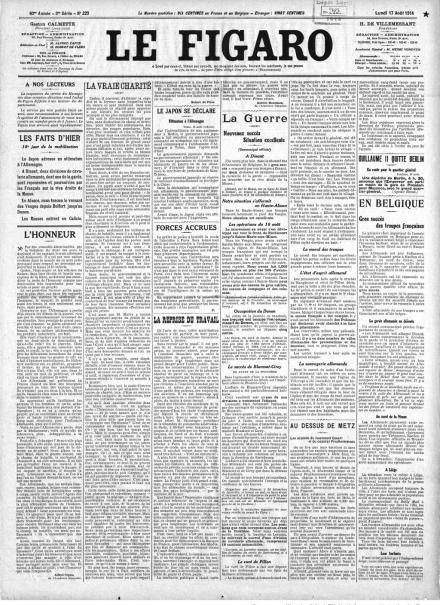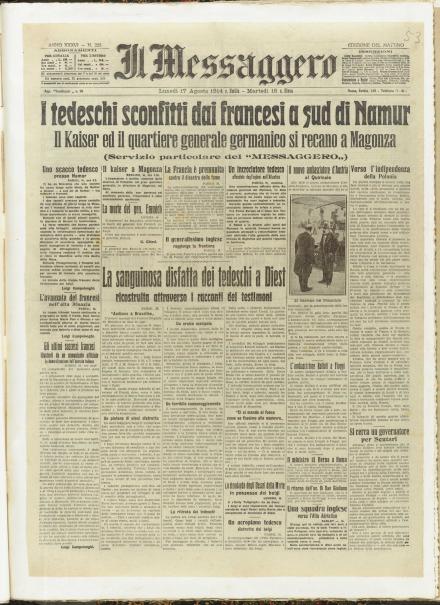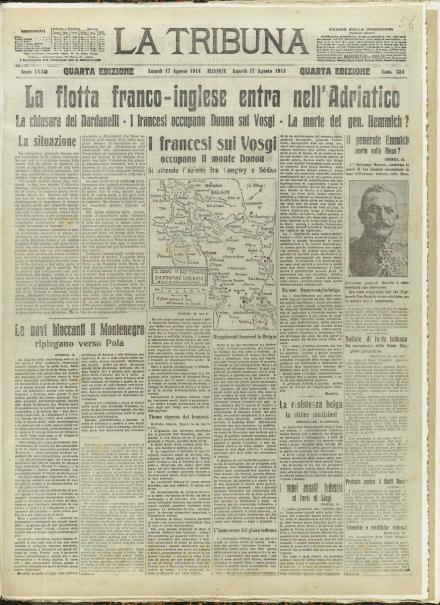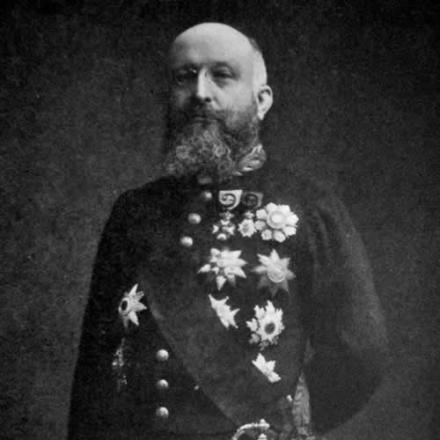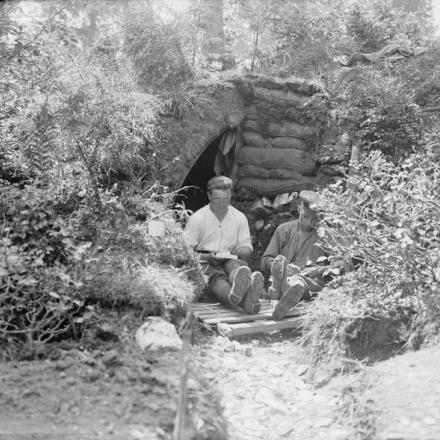Mai sottovalutare i russi
Mai sottovalutare i russi. Possono essere male organizzati e male equipaggiati, ma sono tanti. Troppi. Con un serbatoio inesauribile di soldati, un esercito lo creano in fretta. Germania e Austria-Ungheria hanno sbagliato i calcoli.
I tedeschi erano così sicuri del piano Schlieffen da aver lasciato solo pochi spiccioli a difendere i confini orientali. Pochi ma buoni. Nella battaglia di Stallupönen si attestano su una collina. Chi guida i soldati dello Zar è convinto di vivere ancora nell’ottocento: comanda un assalto alla baionetta; è un suicidio. I tedeschi resistono, ma nonostante tutto l’avanzata russa prosegue, costringendo il nemico ad arretrare.
Il 17 agosto si intensifica una contemporanea offensiva a sud, nella regione austro-ungarica della Galizia. E meno male che i russi non erano pronti; sono bastate due settimane.
L'esercito asburgico sta incontrando difficoltà maggiori del previsto anche in Serbia. Tipi tosti questi slavi. Combattere per difendere la propria casa è una motivazione impareggiabile.
In Belgio la capitale viene spostata ad Anversa: Bruxelles è troppo vicina al fronte; e in più non è ben difesa. Situazione opposta in Francia: in Alsazia l’esercito tedesco è costretto a ripiegare.
Davide Sartori
GLI AVVENIMENTI
Politica e società
- Il Governo belga viene trasferito da Bruxelles ad Anversa.
- Gran Bretagna: iniziano gli arruolamenti speciali nella polizia per sostituire gli uomini partiti per la guerra.
Fronte occidentale
- Il Generale inglese John French allestisce il suo Quartier generale a Le Cateau.
- Alsazia: nuova avanzata francese, vengono prese Marsal e Chateau-Salins.
Fronte orientale
- Continua l’offensiva russa nella Prussia orientale. Resistenza dei tedeschi nella battaglia di Stallupönen, ma l'avanzata russa prosegue e le truppe tedesche si ritirano a Gumbinnen (Gusev).
Fronte meridionale
- Continua la battaglia del Cer tra austro-ungarici e serbi. I primi sono costretti a ripassare il Sava, dopo aver perduto circa 50.000 uomini. Si comincia a combattere anche a Jadar (Zara).
Operazioni navali
- Nell’Adriatico viene affondato un incrociatore austro-ungarico vicino Antivari.
Parole d'epoca
Conte Charles de Lailang
Ambasciatore belga a Londra
Dispaccio a Julien Davignon, Ministro degli esteri belga
London, August 17, 1914.
Sir,
In reply to your despatch of August 7th, I have the honour to inform you that the British Government cannot agree to the Belgian proposal to respect the neutrality of the belligerent. powers in the conventional basin of the Congo.
German troops from German East Africa have already taken the offensive against the British Central African Protectorate. Futhermore, British troops have already attacked the German port of Dar-es-Salaam, where they have destroyed the wireless telegraphy station.
In these circumstances, the British Government, even if they were convinced from the political anzl strategical point of view of the utility of the Belgian proposal, would be unable to adopt it.
The British Government believe that the forces they are sending to Africa will be sufficient to overcome all opposition. They will take every step in their power to prevent any risings of the native population.
France is of the same opinion as Great Britain on account of German activity which has been noticed near Bonar and Ekododo.
Diari
Lady Harriet Julia Campbell Jephson
The Landsturm has been called out and leaves to-day for the Front. These men are the last to be requisitioned, being elderly. After long waiting among Jews, Infedels, and Turks, I at last got entrance to the Chief of Police's office, had my passport taken, paid one mark fifty, and was told to come back on Thursday, when it would be returned from Berlin. The Chief was a gruff, disagreeable old man, who, to my amiable "Guten Tag" and "Adieu" vouchsafed no repley.
A war-Time Jornal, germany 1914 and German travel notes
Parole d'epoca
Brigadier General Alexander Johnston
Up at 4.30am after a good nights sleep and marched off at 6am ... The march was only a short one and we reached Marbaix about 9am. her we received by a crowd headed by the Mayor who read us out an address of welcome and presented us with yet more bouquets! ... After tea I inspected the horses and equipment of my Section. The former I'm glad to say are all right, and none of the latter has been lost, which is really very creditable considering the conditions of the voyage and the fact that both disembarking and embarking etc was done in the dark ...
Great war diaries of Brigadier General Alexander Johnston
